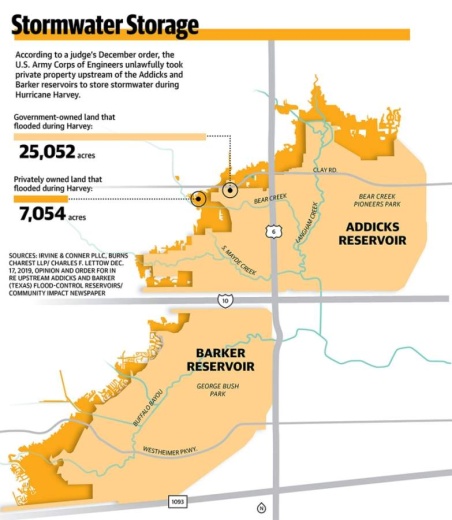On April 28, Senior Judge Charles Lettow of the U.S. Court of Federal Claims will host a hearing by phone regarding litigation about properties upstream of the Addicks and Barker reservoirs that flooded during Hurricane Harvey due to the Army Corps of Engineers Galveston District’s operations of the reservoirs, according to a press release from the team of lawyers representing the property owners.
Before the coronavirus, the attorneys were going to present their arguments in Washington, D.C., per the release.
During the April 28 hearing, the U.S. Department of Justice defense team representing the Corps and the team of lawyers representing the property owners will present their arguments regarding the scope of the government’s permanent flowage easement to help determine how much money property owners are entitled to.
In this lawsuit, a permanent flowage easement refers to the land the Corps used to store inundated water from Hurricane Harvey on private property without compensation, and it refers to the government's right to use the property again, said Mary Conner, who is part of the team of lawyers representing the property owners, in an email interview.
The word "permanent" indicates the Corps will flood the private properties again if the entity does not make any changes to its operations, the team said in a January town hall meeting.
Also at the January town hall meeting, the team of lawyers representing the property owners explained the upstream property litigation has two phases.
The first phase involved determining whether the Corps’ actions were liable and whether the upstream property owners were eligible to receive compensation, the team said.
Lettow issued an opinion and order in December, concluding the actions were liable and the property owners were eligible for compensation.
The second phase will determine damages, the team said at the meeting. The April 28 hearing will help the litigation move forward toward that phase, said Daniel H. Charest, who is part of the team of lawyers representing the property owners, in an email interview.
“There are different aspects to an easement that need to be established to determine its effect on property,” Charest said. “When we better understand the scope of the easement (which is the purpose of the [April 28 hearing], we can turn fully to the just compensation (i.e., damages) phase.”
Both the defense and the property owners’ lawyers have filed briefs on the subject in preparation for the April 28 hearing, according to the release, and Lettow is likely to issue a written order after the April 28 hearing.
A November trial date was tentatively set for the compensation phase, Charest said. Whether the trial date will be changed has yet to be determined, he added.
Additionally, his team has not yet moved the lawsuit for class certification, Charest said. All existing and new upstream property cases filed have been put on hold pending the complaint that Charest and Conner’s team filed in 2017.
Receiving compensation—which could range from $1 billion-$5 billion divvied out among the thousands of property owners who join the class-action lawsuit—will not come immediately for property owners, the team representing the property owners said at the January town hall meeting. After Letter issues an opinion and order about the damages, the government will likely appeal the judge’s decisions.
To receive compensation, however, property owners upstream of the reservoirs must join the lawsuit. They have until August 2023 to sign up. More information is available here.





